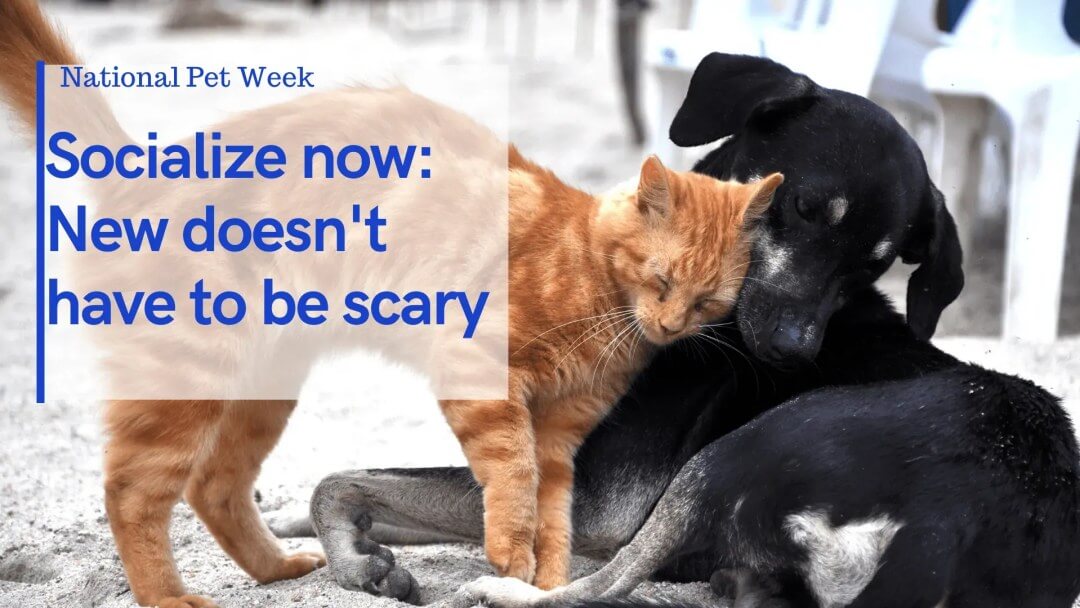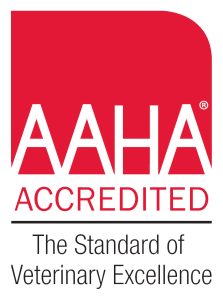
What is socialization?
Socialization is the process of preparing a dog or cat to enjoy interactions and be comfortable with other animals, people, places, and activities. Ideally, socialization should begin during the “sensitive period”, which is between 3 and 14 weeks of age for puppies, and 3 and 9 weeks of age for kittens.
There is a growing body of research into how to socialize puppies and kittens effectively.
The Need for Socialization
The socialization period in companion animals is the time when they are most open to learning about their environment, their littermates, mother, and other animals of their species, humans, and other species. It is a time in the life of a puppy or kitten where providing diverse, positive experiences can prevent the development of fearful responses and subsequent behavioral problems.
Dogs who have more social contacts or attended puppy classes before sixteen weeks of age are less likely to develop fearful or aggressive behavior. Conversely, dogs and cats who lack early non-fearful exposure to a range of environments, people, and other animals as puppies and kitten may become afraid and avoid these situations. In general, animals reared in barren environments (both socially and physically) are unable to deal effectively with the environment and activities a normal companion animal will experience.
Socialization must be carried out in a manner that is mindful of the risk of disease and injury—however, these risks can be managed and should not preclude the provision of appropriate socialization experiences as described below.
The Sensitive Period
A sensitive period exists; it is the time when an animal is most able to benefit from exposure to a range of stimuli. During this period, most puppies and kittens show a high willingness to explore and play and often show little fear when encountering new animals, people, objects, or experiences. If deprived of exposure to people, animals, and situations, they may have an increased risk of developing into adults who have problems with fear, aggression, and arousal.
Exposure to a range of stimuli during the sensitive period should begin with the puppy or kitten raiser by or before three weeks of age and then continue with the owner. Puppies and kittens will expose themselves at their own pace, given suitable opportunities, and their brains and behaviors will rapidly develop through to least 20 weeks of age. During appropriate exposure, puppies and kittens will be comfortable and show no signs of anxiety or struggle when being handled, or when meeting unfamiliar friendly people and dogs. Fearful or shy puppies and kittens should be allowed to experience the world at their own speed, with every social encounter reinforced with biological rewards such as food and play. With continued exposure to people, places, and things, many will continue to adapt their behaviors beyond 20 weeks.
Advice to new puppy and kitten owners
Obtaining a new kitten or puppy is a wonderful and exciting experience. It is also a time where a little extra planning can help a new pet develop the calm and confident temperament that will help them enjoy life to the fullest. The basic tennets of socialization are outlined below
· When obtaining a new puppy or kitten, ask for any pre-adoption socialization plan that your new pet received.
· Create a socialization plan specifically for your pet to prepare them for life in your household. Plan exposures to the animals, individuals, environments, activities, and objects that will be part of their new life.
· Provide regular positive and diverse experiences to encourage your new pet to enjoy new experiences without becoming fearful or aggressive.
· Provide praise, play, and treats to reward engagement. Allow the new pet to withdraw if they are uncomfortable. Move at a pace appropriate for your pet’s personality.
· Well-managed puppy or kitten socialization classes are an excellent way to socialize your new pet within the sensitive period.
· Puppies or kittens that are not fully vaccinated should not be exposed to unvaccinated animals or places they may have been (such as pet stores, outdoor parks, etc.).
· Continue to reward your new pet for calm or playful responses to new social interactions throughout their life.
· For new puppies or kittens with special behavioral needs, develop a plan with your veterinarian and/or another animal behavior expert.
Summary: Socialization Guidelines
- Social exposure should begin at 3-4 weeks of age for kittens and 3-5 weeks of age for puppies. (This illustrates why puppies and kittens from private breeders or foster raised pets are often more socially developed pets.)
- You, the pet owner, must provide a deliberate program of social and environmental exposure for your new pet. Kittens do best when worked with by nine weeks of age and puppies by 12-14 weeks of age, but earlier is better.
- Exposure should include non-threatening, ideally positive experiences with multiple animals of the same and other species, people, stimuli, and common life experiences for pet animals such as handling and transportation.
- When well-managed puppy or kitten socialization classes are available, owners are encouraged to take advantage of these as a source of information and a safe environment for socialization and new learning activities. (Currently, we offer puppy basic and advanced classes for dogs in our Luxury Pet Resort and Doggy Day Care. Kitten socialization classes will be coming soon.)
- The pet’s responses to social and environmental experiences should be assessed, and the program adapted to avoid fearful responses and provide a positive experience in the face of novel stimuli and interactions.
- Social interactions should continue to be reinforced throughout the animal’s life as necessary to support good temperament and promote the wellbeing of the animal.
- Owners should be aware that some puppies and kittens have an innately more fearful temperament and need to be managed differently from individuals who are more bold or placid. For these more fearful animals, seek the advice of a veterinarian and/or an animal behavior specialist.
- Simply exposing adult animals who lacked early exposure to social situations will not likely meet their needs. These animals would benefit more from individually paced interventional programs offered by animal behavior specialists.
- For expert advice or when working with an animal that may have special needs, owners are encouraged to design a socialization plan in consultation with their veterinarian and/or another animal behavior specialist.
These guidelines are not meant to imply that all exposure is equal, that all puppies and kittens are ready for all exposures at the same time, that you stop exposing the animal when the animal is out of the sensitive period, or that if exposed, no animal will have problems. It is widely recognized that the course of socialization differs according to species and individual, and so it is essential to observe the animal closely to determine his or her progress and respond to the needs of the specific animal.
Socialization is essential for helping your new puppy or kitten develop into a happy, fun, and safe companion. Most people find it easier and more enjoyable to live with a pet who’s relaxed with strangers, gets along well with other pets, and adapts easily to new experiences. While some individuals are born with genetic predispositions that can make this difficult or impossible, most animals are very impressionable when young and can learn to take everything in stride. Socializing your puppy or kitten gives them the most excellent chance possible to develop into a pet who’s comfortable in its environment and a joy to be with.
(While this article was written for dogs and cats, the tennets are the same with other pets like birds, small mammals, and even reptiles. The earlier they are positively exposed to novel experiences, the better; for all the same reasons as discussed above.)
About Brook-Falls
Brook-Falls Veterinary Hospital and Exotic Care is dedicated to providing quality care to all companion pets and exotic animals. Brook-Falls is a Menomonee Falls, WI-based full-service veterinary hospital with an extensive range of comprehensive medical, dental, diagnostic, and surgical services to meet the varying needs of all patients. Brook-Falls Veterinary also offers informational and educational media and seminars for pet owners by way of blogs, digital TV series (Expert Veterinary Television), e-books, whitepapers, infographics, and more.
For more information, contact Brook-Falls Veterinary Hospital & Exotic Care, Inc.


